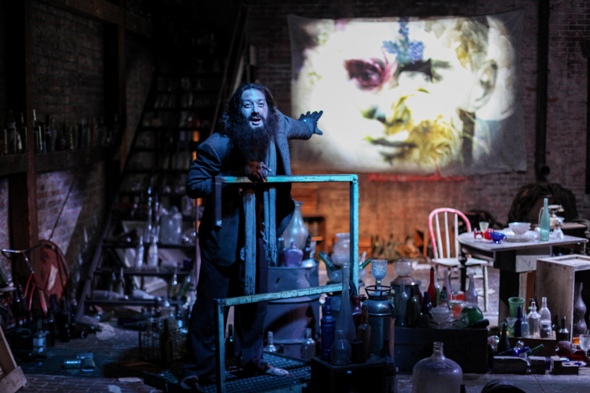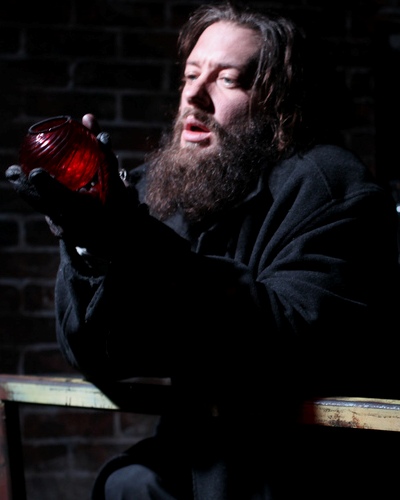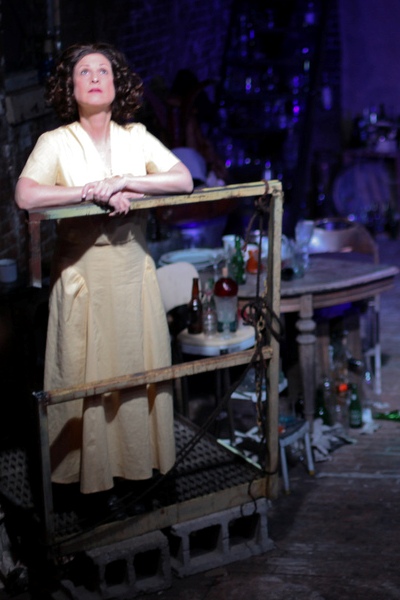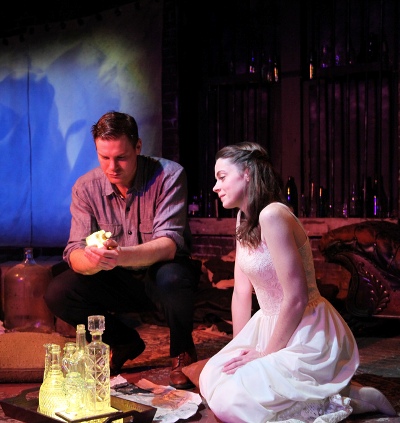As Mary-Arrchie spins Williams’ ‘Menagerie,’ memory play is filtered through glass darkly
 Review: “The Glass Menagerie” by Tennessee Williams, directed by Hans Fleischmann, a Mary-Arrchie Theatre production now playing at Theater Wit through Aug. 25. ★★★★★
Review: “The Glass Menagerie” by Tennessee Williams, directed by Hans Fleischmann, a Mary-Arrchie Theatre production now playing at Theater Wit through Aug. 25. ★★★★★
By Nancy Malitz
The first thing you notice is the glass. It’s everywhere in this back alley, and as your eye adjusts to the dim light it is drawn immediately to the haunting glow of these odd-lot pieces that refract what’s left of the day’s sun.
Wait a minute. Is this somebody’s … collection? Are these junkyard beauties someone’s possessions?
 About then we encounter Tom Wingfield, the narrator of Tennessee Williams’ play “The Glass Menagerie,” which you have likely seen before, but will not think of the same way again.
About then we encounter Tom Wingfield, the narrator of Tennessee Williams’ play “The Glass Menagerie,” which you have likely seen before, but will not think of the same way again.
One of the delights of this 2013 Chicago summer is a gently revisionist production by Marie-Arrchie Theatre, conceived and directed by Hans Fleischmann, who also plays the role of Tom. After selling out last fall at Angel Island and transferring to Theater Wit in May, the show has extended its run to July 28.
Theater Wit is a three-space show hub in Chicago’s Lake View neighborhood north of the Loop, conveniently served by three subway lines. For visitors to Chicago, it’s a chance to experience Chicago’s legendary storefront theater culture in a classic manifestation. For residents, the extended run is a lucky last chance.
“The Glass Menagerie,” as it’s usually done, is a memory play told by the son who long ago abandoned his strong-willed, controlling mother and his crippled, dauntingly shy sister when their desperation and dependence became an impossible psychological burden.
 Typically the focus has gravitated toward Amanda Wingfield, the mother, because it has been such a magnificent role for great aging ladies of the stage and screen. Amanda is indeed a marvelous creature, born into a fading era of southern gentility and matured into a frantic, foolish and altogether toxic mix of dependent femininity and ferocious survival instinct.
Typically the focus has gravitated toward Amanda Wingfield, the mother, because it has been such a magnificent role for great aging ladies of the stage and screen. Amanda is indeed a marvelous creature, born into a fading era of southern gentility and matured into a frantic, foolish and altogether toxic mix of dependent femininity and ferocious survival instinct.
To watch Amanda in action, wielding her convictions with devastating misguidedness, is so mesmerizing that we typically forget to ask what the years have done to Tom. How far away did he actually get?
Fleischmann has thought a lot about that question. Suddenly Tom’s line about time being the “longest distance between two places” is stood on its head. For this Tom, it’s only wishful thinking. This damaged man never did escape. Driven by forces he may not even understand, he has turned his life into a vigil, kept the memory of his fragile, breakable sister aglow. He is still on that back step. His betrayal of his sister and their mother is as fresh as yesterday.
With Maggie Cain as Amanda, surprisingly fresh in her delicacy since her tyranny is anything but, Joanne Dubach as Laura, riveting in her struggle to overcome shyness in an encounter with the gentleman caller of her dreams and Jeff Award winning Walter Briggs as the charming gentleman himself, Fleischmann has created a jewel of a production. Tiny as the Wit’s space is, the story that’s told seems painfully big. It is sustained and amplified by music of Daniel Knox that keeps you at the emotional center. Incidental music in plays and movies often goes unnoticed by the viewer, even though the music’s contribution significantly impacts the whole. This is one musical creation that deserves acknowledgment as significant on its own.
 Grant Sabin’s complex assemblage of a set, artfully lit by Matthew Gawryk, reveals itself in little flickers, degree by degree. Present are all the furniture bits necessary for Tom’s flashbacks to come alive. Fleischmann’s directorial choice, to have the characters speak directly to the audience whenever they are addressing Tom, makes this entire play feel as if you are stuck inside his dream, feeling his guilt, hopelessly accountable to that most rigid of judges, the moral self.
Grant Sabin’s complex assemblage of a set, artfully lit by Matthew Gawryk, reveals itself in little flickers, degree by degree. Present are all the furniture bits necessary for Tom’s flashbacks to come alive. Fleischmann’s directorial choice, to have the characters speak directly to the audience whenever they are addressing Tom, makes this entire play feel as if you are stuck inside his dream, feeling his guilt, hopelessly accountable to that most rigid of judges, the moral self.
“The Glass Menagerie” pivots on an intriguing mother-to-son proposition – Amanda wants Tom to find a prospective husband for Laura, at which point he is free to flee the wage-earning life that feels like a coffin to him. We know enough about Amanda to understand that her intent is to become a dependent in her son-in-law’s home, whoever he may be, but Tom is desperate to escape and acts quickly to line up a possible suitor.
 The playwright calls for glamour magazine images and specific quotations to be projected on the set to underscore certain themes – “The Crust of Humility,” “A Pretty Trap,” “Terror!” – the last particularly apt as Laura realizes that the gentleman caller is in fact a high school hero she once had a crush on. The scene between Laura and Jim is spellbinding; we watch it the way Tom imagines it, her hopes pathetically soaring, her humiliation complete.
The playwright calls for glamour magazine images and specific quotations to be projected on the set to underscore certain themes – “The Crust of Humility,” “A Pretty Trap,” “Terror!” – the last particularly apt as Laura realizes that the gentleman caller is in fact a high school hero she once had a crush on. The scene between Laura and Jim is spellbinding; we watch it the way Tom imagines it, her hopes pathetically soaring, her humiliation complete.
In all productions of this play, the son will walk in the footsteps of his father, who had abandoned the family long before. But it is in this production that we sense Tom has also become like his sister, limiting himself to her own small world of glass, surrounding himself with these inanimate friends who cannot hurt him, polishing them with care because he knows they are, like him now, fragile.
Related Links:
- Performance location, date and times: Details at TheatreinChicago.com
- The play opened in Chicago in 1945: Read Claudia Cassidy’s Tribune review
- Williams pays tribute to the original Amanda: Read it in the New York Times
Captions and credits from top: Hans Fleischmann directs and stars in his re-thinking of Tennessee Williams’ ‘The Glass Menagerie,’ set in a homeless person’s back alley retreat designed by Grant Sabin. Fleischmann as Tom Wingfield, haunted by memories of his sister, fragile as glass. Maggie Cain as Amanda, abandoned wife and faded southern belle, in ferociously difficult times. Fleischmann as Tom, still in the grip of his mother Amanda (Maggie Cain). Walter Briggs is Jim, the gentleman caller, who tries to bring Laura (Joanne Dubach) out of her shell. Mary-Arrchie’s video trailer. Below: Fleischmann as Tom. (Photos by Emily Schwartz)
Tags: Daniel Knos, Glass Menagerie, Grant Sabin, Hans Fleischmann, Joanne Dubach, Maggie Cain, Mary-Arrchie Theatre, Matthew Gawryk, Tennessee Williams, Walter Briggs


